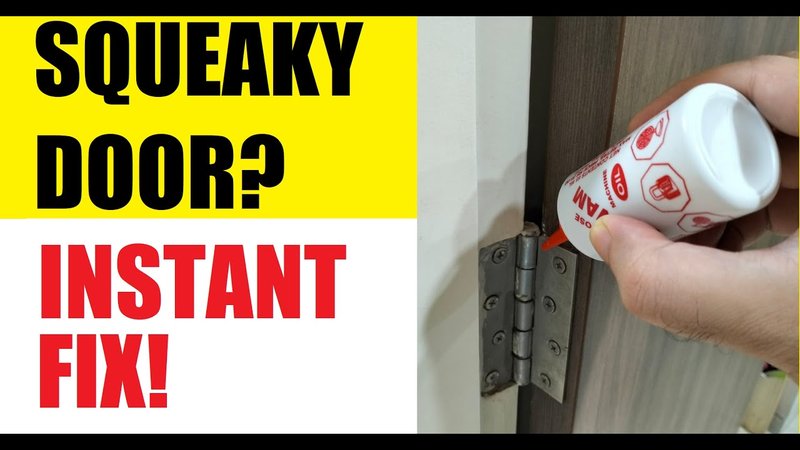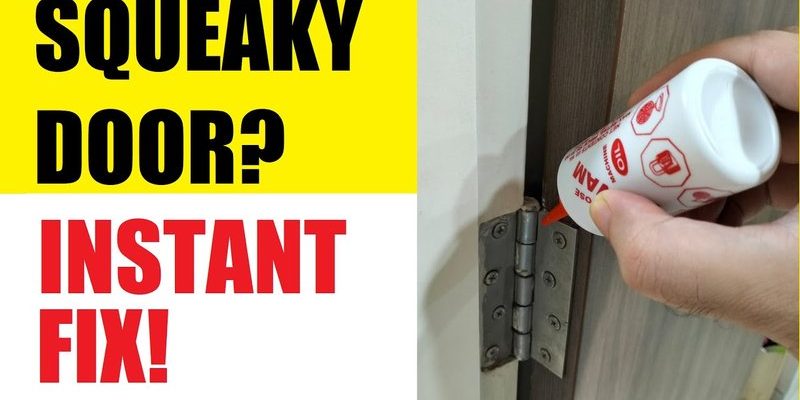
Here’s the thing—door hinges aren’t supposed to sound like a rusty playground swing. When they do, dirt, debris, or plain old wear and tear are often to blame. Just like any hardworking bit of hardware, hinges need a little care to keep doing their job quietly. If you’re trying to fix the issue on your own, you’re in the right place. Let me walk you through what’s causing that grinding noise, what to check for, and how to troubleshoot (and hopefully silence) those squeaky offenders.
What Causes a Door Hinge to Grind?
So, why does your exterior door hinge make a grinding noise? It’s usually not a mystery when you break it down. Think of your door hinge as a tiny mechanical joint—kind of like your knee. Both have multiple moving parts that constantly shift and support weight. When something gets between those parts, like dirt or grit, or when they start to wear down, you’ll hear it. That’s the grind.
Most commonly, the culprit is built-up dirt or grime that has worked its way into the hinge pin or between the hinge plates. Every time you open or close the door, that gunk acts like sandpaper, wearing down the metal and making noise. You might think exterior doors are more protected, but they actually see more abuse—wind, rain, and outdoor dirt sneak in constantly.
Another big reason is metal-on-metal wear. Over time, even the best-quality hinges from brands like Kwikset or Emtek can lose their factory lubrication. Once the protective layer is gone, metal parts scrape and grind against each other, sometimes leaving visible metal shavings or a silvery dust around the hinge.
Finally, sometimes it’s not dirt or wear, but a misaligned hinge. If your door has started to sag (maybe from heavy use or loose screws), the hinge can get pulled out of alignment. That extra stress creates friction and noise every time you use the door. It’s a less common issue, but it’s worth checking if you’ve recently noticed door slamming or sticking.
How to Tell if Dirt or Wear Is the Problem
Honestly, sometimes it’s hard to know what’s really making your hinge grind—until you look closer. A little detective work can save you time and frustration. Here’s how to spot whether dirt buildup or normal wear is behind the noise.
If you notice a gritty, scratching sound when you move the door, pay attention to the texture. Does it sound like sandpaper? That often means there’s dirt or debris inside the hinge. You might also spot actual dirt or dark smudges near the hinge pins or at the base where the hinge sits against the door frame.
Now, if the noise is more of a metallic grinding (almost like two knives scraping together), that’s usually wear. Check the hinges for signs of metal shavings, discoloration, or a greasy, grayish residue. This stuff is leftover metal that’s been shaved off—never a good sign.
You might be wondering if both problems can happen together. The answer: absolutely. Dirt inside the hinge actually speeds up wear, since it acts as an abrasive every time the hinge moves. That’s why keeping things clean and lubricated matters, even if you don’t hear anything yet.
How to Fix a Grinding Exterior Door Hinge
Let me explain—fixing a noisy hinge isn’t rocket science, but it does take a bit of patience (and maybe a drop cloth if you’re working with oil). Here’s a simple step-by-step to help you stop that grinding sound for good:
- Gather your tools: You’ll need a hammer, a nail or hinge pin removal tool, some lubricant (like WD-40, silicone spray, or white lithium grease), an old rag, and maybe a screwdriver.
- Remove the hinge pin: Carefully tap the bottom of the pin with your nail or removal tool until it pops out. Set it aside—these little guys love to roll under furniture.
- Clean the hinge: Wipe out any visible dirt, dust, or old grease from inside the hinge and on the pin itself. If it’s really gunky, a toothbrush works wonders.
- Apply fresh lubricant: Coat the pin and the inside of the hinge barrel with your chosen lubricant. Don’t skimp! The goal is to create a smooth, friction-free surface.
- Reassemble and test: Slide the pin back in, tap it down, and swing the door a few times. Listen closely—most times, the grinding noise will be gone or at least hugely reduced.
If the noise is still there, repeat the process. Sometimes, older or severely worn hinges need a second try, or even a full replacement if the metal is deeply scratched.
When Should You Replace the Hinge?
Even the best troubleshooting can’t save a hinge that’s truly worn out. Here’s how to tell when it’s time to stop cleaning and start shopping for a replacement.
If your hinge feels loose and wobbly even after tightening the screws, or if the pin won’t fit snugly back in place, chances are the metal inside is worn down past the point of a simple fix. Another red flag is visible cracks or warping on the hinge plates. Any sign of the metal bending or splitting means it’s structurally compromised.
Sometimes, after you’ve cleaned, lubricated, and reinstalled everything, the grinding noise returns almost instantly. In this case, the hinge’s interior is likely too damaged for lubrication to do any good. At that stage, investing in a new, high-quality exterior door hinge is the best move—think of it as upgrading your door’s suspension.
It’s worth mentioning that some modern hinges (like ones from Emtek, Schlage, or Stanley) are designed with built-in self-lubricating features. If your door uses one of these, and it’s still making noise, replacement is almost always the right call.
How to Prevent Future Grinding Noises
Once you’ve dealt with a grinding hinge, it’s natural to think, “How do I keep this from happening again?” A little maintenance goes a long way.
- Lubricate hinges regularly: Every six months, give your door hinges a quick spray or dab of lubricant. This prevents dirt buildup and keeps metal parts moving smoothly.
- Keep the area clean: Sweep away any dust or debris near your door threshold. On windy or muddy days, double-check for blown-in grit that can sneak into your hinges.
- Check hinge screws: Every few months, tighten any loose screws on your hinges. Door sagging or shifting can add extra wear and noise over time.
If your home is in a super dusty area or you get a lot of rain and wind, you’ll want to check your exterior hinges more often. Trust me—staying ahead means less troubleshooting later and a much quieter entryway.
Comparing Exterior Hinges: Material Matters
Not all hinges are created equal, and the material can play a huge part in how likely you are to hear that dreaded grinding sound. Let’s break it down:
- Brass hinges: Classic and attractive, they’re more resistant to rust, but they can still grind if dust gets inside. Regular polishing and a little oil keep them smooth.
- Steel hinges: Super strong—great if your door is heavy or you’re in a rough climate. They do need regular lubrication because they can rust or wear faster than brass.
- Stainless steel hinges: These are the MVP if you live near the ocean or in a humid spot. They rarely rust, but they still like a bit of oil to avoid squeaks and grinding.
Some brands offer universal hinges that are supposed to fit any door, but always check the size and weight recommendations. Using a hinge that’s too small (or the wrong material) for your heavy security door, for example, is just asking for trouble.
Common Mistakes to Avoid When Fixing Noisy Hinges
You might be tempted to just squirt a little oil on the outside and call it a day, but let me save you the headache. Here’s what not to do:
- Don’t use the wrong lubricant: Grease that’s too thick (like automotive grease) can attract dirt, making the problem worse. Stick with silicone spray, white lithium grease, or a lightweight oil meant for doors.
- Don’t ignore loose or stripped screws: If the hinge is barely holding onto the frame, grinding will keep happening no matter how much you lubricate.
- Don’t skip cleaning: Lubricating over dirt actually locks in grit and makes the grind even louder. Always clean first, then lubricate.
A few smart choices early on can save you from having to order a replacement hinge or mess with door alignment down the road.
Honestly, a little bit of hinge maintenance every once in a while is like giving your front door a spa day. The result? No embarrassing noises and a door that opens as smoothly as the day you moved in.
When to Call a Professional
Sometimes, no matter how many times you clean and lubricate, that exterior door hinge keeps grinding. If you’ve tried all the troubleshooting steps—maybe even replaced the hinge yourself—and the noise sticks around, it might be time to call in a pro.
Professionals can spot problems that aren’t obvious, like hidden misalignment in your door frame or bigger structural issues with the way your door is hung. A pro might spot a warped frame, rotted wood, or even an undersized hinge for the weight of your door. If you’re not handy with tools, there’s no shame in getting help.
Another good reason to call a professional? If your door has security features wired into it (like a smart lock or sensor from brands such as August or Yale), you want someone who can safely remove and re-install those systems. Some warranties, especially on brand-name security doors or remotes, require professional service for repairs.
Final Thoughts: Keeping Your Door (and Your Sanity) Quiet
A grinding exterior door hinge isn’t just an annoying noise—it’s a sign that something’s not working as it should. Whether your troublemaker is a bit of dust, a worn hinge pin, or a tired old hinge from a trusted brand, a little care goes a long way. Regular cleaning, the right lubricant, and an occasional check for loose screws will keep your entry quiet and welcoming. And if you ever need to troubleshoot deeper issues, don’t be afraid to call in some help. Your ears—and your door—will thank you.
